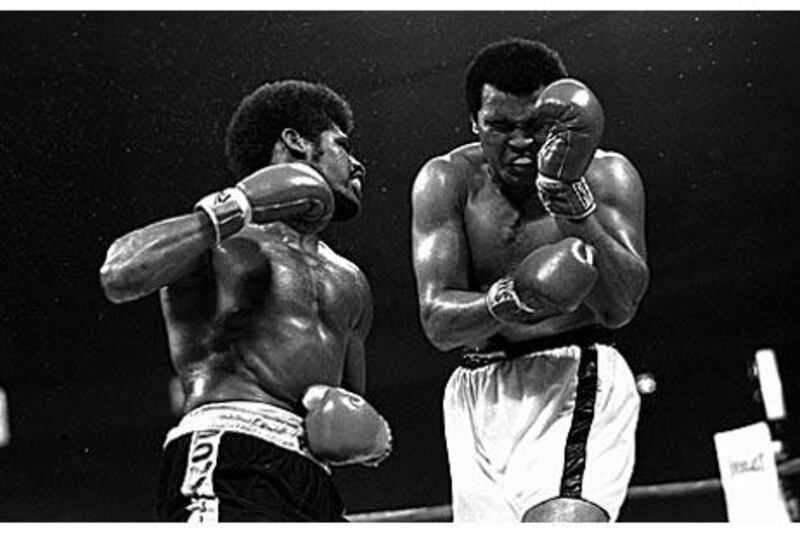This will be just another morning in the life of Leon Spinks. He will collect his bucket and broom from the janitor's locker at the YMCA mission in Columbus, Nebraska, and begin his working day by cleaning the toilets. Later, if he is not too tired - his energy levels are no longer what they were - he will walk along 23rd Street to mop the floors of a burger parlour. Every dollar counts. The estimated US$5.5 million (Dh20.2m) he earned in the boxing ring went into other pockets and it is not easy to find work when you display the early symptoms of dementia, from the result of too many blows to the head or from the long years of drug and alcohol abuse, who can say?
At the age of 56, Spinks can offer no explanation. As he puts it, "I ain't no Dr Kildare ..." A born fighter, he neither expects nor welcomes pity. "I know a lot of people think I must have been dumb to do what I did. But at least I wasn't no educated fool." It was all so different on February 15, 1978, when Spinks hit the biggest jackpot of all in the Las Vegas Hilton Hotel. He clubbed his way to one of the greatest upsets in boxing history by beating Muhammad Ali to become heavyweight champion of the world in only his seventh professional bout.
The light-heavyweight gold medallist at the Montreal Olympics two years earlier, Spinks's brawling, back-alley style was thought to be tailor-made for Ali, coming as he was off three 15-round victories over Ken Norton, Alfredo Evangelista and a particularly brutal encounter with Earnie Shavers. The ageing champ certainly detected no threat from Spinks; his entire "training" schedule consisting of a contemptuously brief 10 rounds of sparring amid a welter of interviews and talk show appearances. Ali had been promised one easy bout before retirement by his handlers - he had long since surrendered any say in business matters to those he misguidedly trusted - and Spinks had been presented to him as a human punch-bag.
But when the out-of-condition Ali climbed through the ropes content to go through the motions, Spinks came out of his corner from the first bell like a man possessed, unleashing a fusillade of bar-room round-houses which, although lacking in accuracy, found the target often enough to put the challenger well ahead on points. By the time Ali realised his crown was in danger of passing into unworthy hands, he had run out of both rounds and stamina to mount a comeback.
Shamefully, one of the judges decreed Ali the winner despite the fact that he had hardly thrown a punch. But justice prevailed as Spinks was awarded the title on a split decision. After flashing his famous gap-toothed grin for the cameras, the new champion celebrated his success with excess. Within 48 hours Spinks was again on the front pages, this time in handcuffs after his arrest for being in possession of cocaine.
Ali - by then 36 and a virtual caricature of the magnificent athlete he had been - trained as never before in order to look the part of a gladiator for the return bout seven months later, while Spinks embarked on a merry-go-round of lunacy which brought him three further convictions for various offences. "I didn't understand what it meant to be heavyweight champ," he recalled. "I was just Leon and that's all I ever wanted to be, just Leon." As his trainer, Sam Solomon, put it: "When Leon became champ it was like taking a man off the street and making him president."
Spinks insists he was finely tuned for the second bout, at the Louisiana Superdome in New Orleans - "I'd put on some weight but I was still in shape" - which attracted a then record indoor audience of 63,532, all them eager to see if Ali could become the first man to win the world heavyweight championship three times. If truth be told, Ali was only marginally better second time round, content to land a few jabs then dance around the ring as the woeful Spinks plodded after him like a zombie emerging from a swamp, the clubbing punches he had exhibited in the first fight diminished by seven months of nightclubbing. Ali regained the title with a unanimous points victory and announced his retirement from the ring, a decision he would later be persuaded to rescind with tragic consequences.
Although Spinks would subsequently challenge Larry Holmes three years on and briefly hold a version of the cruiserweight title, his career had entered an inexorable downward spiral. When he lost to John Carlo in 1994 it was the first occasion in which a former heavyweight champion of the world had been knocked-out in the first round - without throwing a single punch - by an opponent making his professional debut.
A gentle and caring man who spends much of his spare time helping disadvantaged youngsters, Spinks will return to Las Vegas on March 6 to attend his son Cory's defence of the IBF junior-middleweight title against Cornelius Bundrage. As is the custom on such occasions, he will climb through the ropes to be introduced to ring- siders in the company of the other ex-champions in attendance. "Olympic gold medallist and former heavyweight champion of the world - Leon Spinks," he proclaims with pride.
"They might have taken everything else off me, but that is the one thing they can't take. That at one time I was king of the world ..." @Email:sports@thenational.ae





